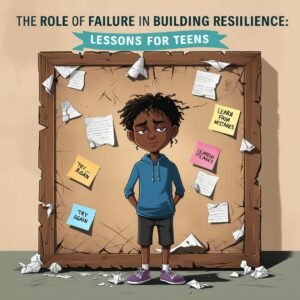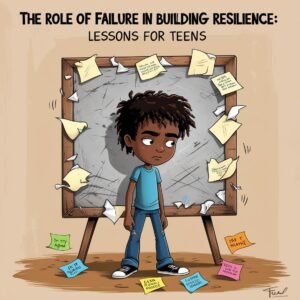The Role of Failure in Building Resilience: Lessons for Teens
The Role of Failure in Building Resilience: Lessons for Teens
Let’s be honest — failure sucks. Whether it’s a bad grade, not making the team, or getting ghosted by a friend group, it stings. And in a world where teens are constantly measured by scores, followers, and likes, failing can feel like the end of the world.
But here’s the truth: failure is part of the process — not the opposite of success, but a step toward it. More than that, it builds something even more important than good grades or trophies: resilience.
Why Teens Struggle So Much With Failure
If you’re a teen (or raising/teaching one), this probably sounds familiar:
- A single bad test feels like your future’s ruined.
- You mess up once and think you’re just “not good enough.”
- You don’t even try something new because what if it goes wrong?
That’s because somewhere along the way, we’ve made failing feel shameful instead of normal. Between school pressures, social media, and sky-high expectations, teens are often terrified of making mistakes.
But that fear of failure? It’s what holds them back the most.
So, What Is Resilience?
Resilience is what helps you get up after falling down. It’s not about pretending everything’s fine or “being tough.” It’s about facing setbacks, dealing with the emotions, and still moving forward.
And here’s the best part: resilience isn’t something you’re born with — it’s something you build.
What Builds Resilience in Teens:
- Emotional awareness – being able to name and handle feelings instead of shutting down.
- A growth mindset – believing that skills can improve with time and effort.
- Problem-solving – figuring out what to do next when things go wrong.
- Support systems – having people around you who encourage rather than criticize.
How Failure Actually Helps You Grow
It’s not just a nice idea — failure really does help build resilience. Here’s how:
1. It Makes You More Self-Aware
When you fail, you learn a lot about yourself. What went wrong? What can I do differently? That kind of reflection helps you grow and stop repeating the same mistakes.
💡 Tip: Instead of saying, “I suck at this,” ask, “What can I try next time?”
2. It Teaches You to Value Effort, Not Just Results
Nobody gets it right the first time. Whether it’s sports, music, friendships, or math, progress comes through trial and error. When you’re okay with failing, you start to focus more on learning than just winning.
🔍 SEO win: “growth mindset for teens” is key here — and it’s true. The more teens understand that learning isn’t linear, the less afraid they’ll be to try.
3. It Builds Emotional Strength
Failing doesn’t just hurt your pride. It can bring up embarrassment, sadness, frustration — all those fun emotions. But sitting with those feelings and working through them is what emotional resilience is all about.
And the more you do it? The easier it gets.
4. It Makes You More Creative and Flexible
Sometimes things don’t go to plan. When that happens, you get to think outside the box. Plan A didn’t work? Cool. Time to test Plan B. Or C. Resilient teens don’t just bounce back — they bounce forward with new ideas.
🎯 Use this keyword: “teaching adaptability to teens.”
Real-Life Fails That Turned Into Wins
Everyone messes up. Even the people we look up to.
- Michael Jordan didn’t make his high school varsity basketball team. Now he’s considered one of the greatest athletes ever.
- J.K. Rowling was rejected by 12 publishers before someone took a chance on Harry Potter.
- Zendaya started out getting side roles and turned rejection into fuel for her career.
Failure didn’t end their stories. It shaped them.
How Adults Can Support Resilience (Without Hovering)
If you’re a parent, teacher, or mentor, your role matters. Teens won’t always admit it, but they’re watching how you respond to failure.
Here’s how to help:
1. Be Real About Your Own Failures
Share your struggles. Let them see how you handled things that didn’t go your way. It builds trust — and shows that failure doesn’t define you.
2. Talk About Failure Differently
Instead of “Why did you mess up?” try, “What do you think you learned from that?” Language matters.
3. Praise the Process
Don’t just say, “Nice job on that A.” Say, “I saw how much effort you put in — that’s what counts.” It helps teens focus on growth, not perfection.
4. Give Them Space to Struggle
It’s tempting to swoop in and fix things. But sometimes, the best support is letting teens figure it out. Failure in safe, low-stakes situations helps build real-world confidence.
What Schools Can Do Better, Too
Resilience should be part of education — not just something teens learn the hard way. Here’s what schools can change:
- Create safe spaces to fail — like ungraded drafts, group projects, and experiments.
- Encourage reflection — let students talk about what went wrong and what they’d try next.
- Reward effort and progress, not just perfect scores.
These small shifts teach students that setbacks aren’t shameful — they’re part of learning.
The Takeaway: Failure Isn’t the End — It’s the Beginning
For teens, failure can feel like everything’s falling apart. But with the right mindset and support, it becomes something else: a starting point.
Building resilience in teens means letting them fall — and helping them rise. It’s about teaching them that their worth isn’t tied to being perfect, but to their ability to keep showing up, trying again, and learning as they go.
Let’s stop treating failure like something to avoid — and start treating it like the life lesson it is.







